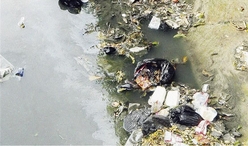Malaria breeds money - $1B for on-call payments to health workers; Health ministry launches investigation
Published: Sunday | August 2, 2009

Tyrone Reid, Sunday Gleaner Reporter
The Ministry of Health will be launching an investigation into allegations of wanton abuse and mismanagement of an on-call payment facility, specially approved by the finance ministry to compensate public-health nurses and other health workers for the extra work they were expected to perform during the malaria outbreak in 2006.
The Sunday Gleaner understands that approximately $1 billion was paid out under the special-payment mechanism long after the spread of the vector-borne disease had been contained.
In addition, the money was paid to many public health nurses who had not dealt with a single case of the disease.
"We will be launching an investigation ... ," said Dr Sheila Campbell-Forrester, chief medical officer in the health ministry.
She added: "One of the things that we would have to now do is to go back and look at all of this, and it may happen that all may have been put on the roster at the same time."
Sunday Gleaner sources pointed out that nurses were paid the money as a matter of course, and some of them took home as much as $300,000 per month in the special on-call payments.
"When you are on call, it is supposed to be rostered, but everybody was just paid on a monthly basis. It is something that they have been milking. The nurses have been unfair," the source revealed.
Officials seeing red
The Sunday Gleaner also understands that several high-ranking officials in the health ministry are seeing red because the nurses were allegedly allowed to see so much 'green'. "It is really about management incompetence," one official remarked.
"It is scandalous really, the amount of money that was paid under false pretences. Some of them (nurses) abused it … and they were not called out in three years," the official added.
The Sunday Gleaner was also informed that each regional authority should have monitored the claims being made under the special arrangement.
Donald Farquharson, acting regional director of the South-East Regional Health Authority (SERHA), refused to say much about the alleged abuse of the 'malaria money'.
"The Ministry of Health is dealing with the matter and, therefore, we are not in a position to comment on it," said the head of SERHA, which governs the Kingston Public Hospital, the Bustamante Hospital for Children, the Victoria Jubilee Hospital and the Princess Margaret Hospital in Morant Bay, St Thomas.
The Sunday Gleaner was unsuccessful in its effort to get a response from the other three regional health authorities.
Ministry's position
In an attempt to provide a response on the malaria-money matter, a team of health officials comprising Dr Campbell-Forrester, Dr Leila McWhinney-Dehaney, chief nursing officer, Claudette Walker, acting director of human-resource management and corporate services, and Stephanie Shaw-Smith, public relations and communications manager at the Health Ministry, granted The Sunday Gleaner an interview Friday night.
The team members did not have all the answers and could not say how much had been paid out under the programme. But, was there abuse?
"We can't answer you that question because we don't have that information in front of us," said Dr Campbell-Forrester.
In defence of the nurses, Dr McWhinney-Dehaney said, "Nurses worked tirelessly to meet the needs of this country.
"There is no evidence to support, from where we stand at this point, that they collected it for work they did not perform," she said.
Dr Campbell-Forrester jumped in and pointed out that "June 30 was the deadline for curtailing this arrangement". However, she admitted that the special-payment programme had been extended a few times before finally being plugged at the end of June.
It is currently under review to determine if it should be extended again in light of the H1N1 threat.
Value for money
The chief medical officer also opined that the approximately $1 billion the Government allegedly paid out in less than three years might prove to be value for money. "And that may be a small price to pay, especially when you consider that we have had about nine or 10 cases of malaria since the start of this year ... . Cost benefits must be considered," she said.
According to Dr Campbell-Forrester, the medical world is pleased with Jamaica's success, so far, in controlling and curtailing the spread of the disease since its reappearance in late 2006.
Walker pointed out that other health workers who worked under the malaria programme, had also benefited from the special-payment arrangement.
"There were some other categories of workers that were working in malaria that it would have affected, and not just nurses."
The ministry officials lamented that all the public-health nurses, approximately 275 of them, had had to be put on call because of a severe shortage of these nurses.
Westmoreland has less than 50 per cent of the required cadre of public-health nurses that the parish needs. At the outset of the malaria outbreak, the parish had at most, three public-health nurses. Now, it has six.
"We had to have arrangements for malaria and it had to be islandwide, even though there were no cases in some parishes because of the nature of it and the way people travel. Initially, the coverage had to be islandwide," Walker said.
Dr Campbell-Forrester said the country must be made aware that public-health investigation for malaria is quite intensive. "And, remember, in 2008, we went up to over 300 cases," she said.
"We would admit that the cases may have declined ... but we started to have some sporadic (cases) in key areas," she added.
tyrone.reid@gleanerjm.com









